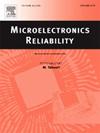Study on gate oxide reliability of SiC power MOSFETs under 300 MeV proton irradiation
IF 1.6
4区 工程技术
Q3 ENGINEERING, ELECTRICAL & ELECTRONIC
引用次数: 0
Abstract
Although operating at a lower drain bias voltage reduces the risk of Single-Event-Burnout (SEB), whether SiC power MOSFET can be reliably applied under low-voltage irradiation conditions remains to be investigated. This study evaluated the gate oxide reliability of SiC power MOSFETs irradiated with a 300 MeV proton beam. Different drain bias levels and total fluence values were selected in the irradiation experiment. The critical voltage for SEB occurrence in the selected device samples was obtained. For devices that did not experience SEB after irradiation, their electrical characteristics remained largely unchanged; however, significant degradation in gate oxide reliability was observed during Time-Dependent Dielectric Breakdown (TDDB) tests, suggesting potential long-term reliability concerns. Furthermore, degradation of gate oxide reliability requires the irradiation bias to exceed a certain threshold, and the degradation severity is positively correlated with irradiation fluence, demonstrating a cumulative radiation damage effect. These findings provide critical insights for ensuring the reliable application of SiC power devices in aerospace systems.
300 MeV质子辐照下SiC功率mosfet栅氧化可靠性研究
虽然在较低的漏极偏置电压下工作可以降低单事件烧毁(SEB)的风险,但SiC功率MOSFET是否可以在低压辐照条件下可靠地应用仍有待研究。本研究评估了300 MeV质子束辐照下SiC功率mosfet的栅氧化可靠性。在辐照实验中选择了不同的漏偏置水平和总通量值。在选定的器件样品中获得了SEB发生的临界电压。对于辐照后未经历SEB的设备,其电气特性基本保持不变;然而,在时间相关介质击穿(TDDB)测试中观察到栅极氧化物可靠性的显著下降,这表明潜在的长期可靠性问题。栅极氧化物可靠性的退化需要辐照偏置超过一定阈值,且退化程度与辐照通量呈正相关,表现出累积辐射损伤效应。这些发现为确保SiC功率器件在航空航天系统中的可靠应用提供了重要见解。
本文章由计算机程序翻译,如有差异,请以英文原文为准。
求助全文
约1分钟内获得全文
求助全文
来源期刊

Microelectronics Reliability
工程技术-工程:电子与电气
CiteScore
3.30
自引率
12.50%
发文量
342
审稿时长
68 days
期刊介绍:
Microelectronics Reliability, is dedicated to disseminating the latest research results and related information on the reliability of microelectronic devices, circuits and systems, from materials, process and manufacturing, to design, testing and operation. The coverage of the journal includes the following topics: measurement, understanding and analysis; evaluation and prediction; modelling and simulation; methodologies and mitigation. Papers which combine reliability with other important areas of microelectronics engineering, such as design, fabrication, integration, testing, and field operation will also be welcome, and practical papers reporting case studies in the field and specific application domains are particularly encouraged.
Most accepted papers will be published as Research Papers, describing significant advances and completed work. Papers reviewing important developing topics of general interest may be accepted for publication as Review Papers. Urgent communications of a more preliminary nature and short reports on completed practical work of current interest may be considered for publication as Research Notes. All contributions are subject to peer review by leading experts in the field.
 求助内容:
求助内容: 应助结果提醒方式:
应助结果提醒方式:


